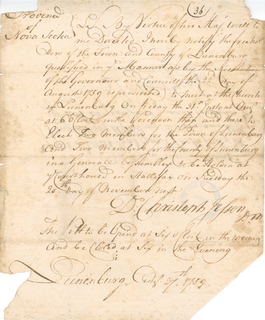
Parliamentary procedure is the body of rules, ethics and customs governing meetings and other operations of clubs, organizations, legislative bodies and other deliberative assemblies.

The Parliament of Canada is the federal legislature of Canada, seated at Parliament Hill in Ottawa, the national capital. The body consists of the Canadian monarch, represented by a viceroy, the Governor General; an upper house, the Senate; and a lower house, the House of Commons. Each element has its own officers and organization. By constitutional convention, the House of Commons is dominant, with the Senate and monarch rarely opposing its will. The Senate reviews legislation from a less partisan standpoint and the monarch or viceroy provides royal assent to make bills into law.
Question Period, known officially as Oral Questions occurs each sitting day in the House of Commons of Canada. According to the House of Commons Compendium, “The primary purpose of Question Period is to seek information from the Government and to call it to account for its actions.”

A writ of election is a writ issued ordering the holding of an election. In Commonwealth countries writs are the usual mechanism by which general elections are called and are issued by the head of state or their representative. In the United States, it is more commonly used to call a special election for a political office.
Diane Marleau, was a Canadian politician. She represented the riding of Sudbury in the House of Commons of Canada from 1988 to 2008, and was a cabinet minister in the government of Jean Chrétien. Marleau was a member of the Liberal Party of Canada.
In parliamentary procedure, unanimous consent, also known as general consent, or in the case of the parliaments under the Westminster system, leave of the house, is a situation in which no member present objects to a proposal.
Salter Adrian Hayden, was a Canadian lawyer and senator.
Residency is the act of establishing or maintaining a residence in a given place. Residency is a concept which heavily affects the legal rights and responsibilities that are available to a person, including eligibility to vote, eligibility to stand for political office, eligibility to access government services, responsibility to pay taxes, and on and so forth.
James Alexander Hart is a Canadian politician.
A legislative session is the period of time in which a legislature, in both parliamentary and presidential systems, is convened for purpose of lawmaking, usually being one of two or more smaller divisions of the entire time between two elections. In each country the procedures for opening, ending, and in between sessions differs slightly. A session may last for the full term of the legislature or the term may consist of a number of sessions. These may be of fixed duration, such as a year, or may be used as a parliamentary procedural device. A session of the legislature is brought to an end by an official act of prorogation. In either event, the effect of prorogation is generally the clearing of all outstanding matters before the legislature.
The Clerk of the House of Commons is the senior administrative officer in the House of Commons of Canada.
John Roderick Dahmer was elected a member of the House of Commons of Canada in 1988. His background was in education. A school teacher, guidance councillor, principal, and later involved in adult education, correctional education and vocational training as a director at Lakeland College.
Beauchesne's Parliamentary Rules and Forms is a Canadian parliamentary authority. The first edition was published in 1922 by Arthur Beauchesne, Clerk of the House of Commons of Canada from 1925 to 1949.
The history of parliamentary procedure refers to the origins and evolution of parliamentary law used by deliberative assemblies.
Bourinot's Rules of Order is a Canadian parliamentary authority originally published in 1894 by Sir John George Bourinot, Clerk of the House of Commons of Canada under the title A Canadian Manual on the Procedure at Meetings of Shareholders and Directors of Companies, Conventions, Societies, and Public Assemblies generally. The title page states that it is an abridgement of the author's larger work, but it should be seen as a shorter re-write, dealing in considerable depth with public meetings outside and separate from the Parliament in Ottawa. The fourth, posthumous, edition of the work was given the cover title of the present article. The document is widely used in Canada to set procedures for formal meetings in government, companies and other organizations.
A governor general's warrant is a document authorizing Canada's President of the Treasury Board to spend money appropriated by Parliament. The Governor General may also issue a special warrant which allows the government to spend funds without an appropriation from Parliament. A special warrant may only be issued when money is "urgently needed" after Parliament has been dissolved and until sixty days after the dates set for the return of election writs.

This article is the Electoral history of Alexander Mackenzie, the second Prime Minister of Canada. A Liberal, he served one term as Prime Minister. He became Prime Minister after defeating the government of Sir John A. Macdonald on a non-confidence motion in 1873 and then winning the general election of 1874. He later lost the general election of 1878 and Macdonald returned to power.




